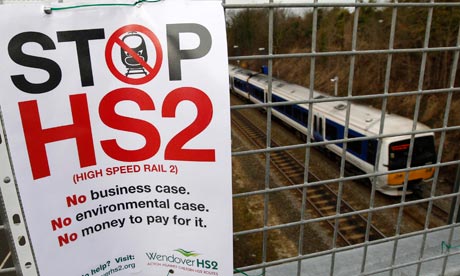The transport secretary will attempt to underline the benefits of high-speed rail to the rest of the country, beyond the planned routes between London, Birmingham, Manchester and Leeds, as she gives the green light to the £32bn project on Tuesday.
Justine Greening will confirm the first phase of the route from London to Birmingham on which high-speed trains will start running in 2026. She will also stress that the investment will mean faster, better services, and more trains to destinations beyond Britain's second city, and emphasise the first phase should be only the foundation of a future network.
With opponents of the project questioning the huge expenditure for time savings of half an hour between London and Birmingham, the government will stress that early beneficiaries of the scheme will be places off or beyond the HS2 route. Some high-speed trains – although not the double deckers mooted at the weekend by Greening – would continue onward on existing track to destinations on the west side of the country. Liverpool, Glasgow and Preston will first to benefit from these through-running services from 2026, travelling the first stage from London to the West Midlands at more than 200mph.
Manchester would also see reduced journey times southwards even before the network's second phase is finished in 2032, connecting it to Birmingham. At that point, should a proposed spur joining the Eurostar route out of St Pancras be built, passengers from Paris will have the tantalising prospect of reaching Manchester on direct trains in 3½ hours.
Leeds will be equally accessible when the second branch of the Y-shaped network is finished also in 2032. It will cut journey times from Birmingham to Leeds – and beyond to Durham and Newcastle – by almost an hour.
A Department for Transport source said: "HS2 is not just about getting between London, Birmingham, Leeds and Manchester more quickly, but bringing faster services and many more seats to towns and cities well beyond the HS2 network.
"It would work just like a motorway. No one uses a motorway to get all the way from their front door to their final destination, but they use it because it offers high capacity and faster services – precisely what HS2 will offer rail passengers."
Numerous business leaders, unions and some economists have recently come out in favour of the scheme, although others describe the government's economic case as seriously flawed. Environmental groups have expressed loud concerns.
While the benefits of faster links may be clearer for towns and cities in the north, the government will have to contend with anger in its heartlands in southern constituencies, which will face the prospect of years of construction for no direct local benefit.
On Monday the Countryside Alliance warned that the government had yet to take "full consideration of the devastating impact HS2 will have on Britain's countryside or the lives of the hundreds of thousands of people living along the route".
The concerns of campaigners in the Chilterns are likely to be tempered by mitigation measures, possibly including an extra stretch of tunnel north of Amersham in the Chiltern hills, meaning that miles of the track would run underground. This alteration to the route is believed to one of the considerations that led Greening to delay her decision from December. It is unlikely to completely assuage local fears about the effects of building the network, with some calculating that merely removing the spoil from tunnelling will involve many hundreds of thousands of lorry journeys, but might give political cover to Tory MPs such as the Welsh secretary, Cheryl Gillan, who has threatened to resign over HS2.
The coalition's immediate concern is whether Gillan feels the package fails to make any changes in her constituency of Chesham and Amersham; she has said she would rather resign than accept the route as it has been proposed but officials have worked hard in consultation with MPs and ministers to take on board their concerns and suggested the eventual route will show the government has listened.
One source suggested Gillan had indicated she might not decide until the legislation has been published in 2013 – a date allowing the government some leeway in dealing with any parliamentary rebellion. One MP at the vanguard of opposition – Andrea Leadsom, MP for South Northamptonshire – has predicted "more than 30" MPs may rebel.
Any vote at second reading of the legislation could be as late as autumn 2013, meaning the flashpoint for any resignations or parliamentary revolt would be delayed significantly. Pressure is not acute on the government as Labour supports the plan and legislation would be likely to pass easily, but the prime minister, David Cameron, will not want to lose a cabinet minister as it would force a reshuffle he has not been inclined to perform.








